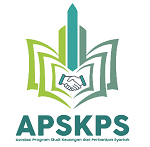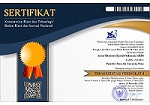Factors Affecting The Level Of Public Understanding Of Sharia Banking Products
Abstract
Keywords
Full Text:
PDFReferences
Andri, S. (2009). Bank dan Lembaga Keuangan Syariah, Jakarta: Kencana. Undang-Undang Repoblik Indonesia Nomor, 23.
Antonio, M. S., Sanrego, Y. D., & Taufiq, M. (2012). An analysis of Islamic banking performance: Maqashid index implementation in Indonesia and Jordania. Journal of Islamic Finance, 176(813), 1-18.
Adulsyani, Sosiologi: Skematika, Teori Dan Terapan, Jakarta : Bumi Aksara, 2018
Aziz, F. A., & Irfangi, A. (2021). Analysis of Profit-Sharing Knowledge And Bank Interest In Understanding Of Sharia Banking Operational Management And Its Implications For Saving Students In Sharia Banking. Palarch's Journal Of Archaeology Egypt/Egyptology, 18(3), 525-538.
Ahmed, I., Usman, A., Farooq, W., & Usman, M. (2022). Shariah board, web-based information, and branding of Islamic financial institutions. Journal of Islamic Marketing, 13(3), 717-739.
Adinugraha, H. H., & Muhtarom, A. (2021). Understanding Of Islamic Studies Through Sharia Economics Perspective In Indonesia. Journal of Islamic Economics Perspectives, 3(1), 17-31.
Alwi, S., & Khotijah, S. A. (2022). Analysis of the Lack of Public Knowledge Regarding the Development of Islamic Banking in Indonesia. CASHFLOW: Current Advanced Research On Sharia Finance and Economic Worldwide, 1(4), 85-92.
Arifin, M. (2021). The Influence Of Islamic Law And Economic Principles On the Banking Industry In Indonesia. Journal Of Legal, Ethical And Regulatory Issues, 24(7), 1-11.
Awaluddin, M., Suyuti, M. G., & prilmayanti Awaluddin, S. (2020). Optimization of Islamic Institute Role in Promoting Sharia Banking in Indonesia. Jurnal Minds: Manajemen Ide dan Inspirasi, 7(2), 79-94.
Altaf, M., Iqbal, N., Mohd. Mokhtar, S. S., & Sial, M. H. (2017). Managing consumer-based brand equity through brand experience in Islamic banking. Journal of Islamic Marketing, 8(2), 218-242.
Iswanaji, C., Muslim, A., & Hasbi, M. Z. N. (2022). Ijarah Collaborative Service Model in Sharia Banking. Indonesian Interdisciplinary Journal of Sharia Economics (IIJSE), 5(2), 702–719. https://doi.org/10.31538/iijse.v5i2.1778
Ilfita, K., & Canggih, C. (2021). The Influence of Sharia Financial Literacy, Religiosity, and Perception of Saving Students’ Interest in Sharia Banks. Indonesian Interdisciplinary Journal of Sharia Economics (IIJSE), 3(2), 113-134.
Musyahidah, S., Ermawati, E., & Nurdin, N. (2021). The Effect of Riba Avoidance and Product Knowledge on the Decision to Become a Customer of Islamic Banks. International Journal of Multidisciplinary Research and Analysis, 4(08).
Nani, D. A. (2019). Islamic Social Reporting: the Difference of Perception Between User and Preparer of Islamic Banking in Indonesia. TECHNOBIZ: International Journal of Business, 2(1), 25-33.
Nugraha, K., Arief, M., Abdinagoro, S. B., & Heriyati, P. (2022). Factors Influencing Bank Customers’ Orientations toward Islamic Banks: Indonesian Banking Perspective. Sustainability, 14(19), 12506.
Nugraheni, P. (2018). Sharia supervisory board and social performance of Indonesian Islamic Banks. Jurnal Akuntansi dan Auditing Indonesia, 137-147.
Nugraheni, P., & Widyani, F. N. (2021). A study of intention to save in Islamic banks: the perspective of Muslim students. Journal of Islamic Marketing, 12(8), 1446-1460.
NAB Rahman, N Ahmadi (2016). Metodologi Penelitian Ekonomi. Medan: Press FEBI
Sharma, R. R., Newaz, F. T., & Fam, K. S. (2017). Muslim religiosity, generational cohorts and buying behavior of Islamic financial products. Australian Journal of Management, 42(3), 482-501.
Tumewang, Y. K., Isnaini, R. N., & Musta’in, J. L. (2019). The impact of the macro economy on the profitability of Islamic banks. Asian Journal of Islamic Management (AJIM), 101-108.
Souiden, N., & Rani, M. (2015). Consumer attitudes and purchase intentions toward Islamic banks: the influence of religiosity. International journal of bank marketing.
Setiawan, B., Puspitasari, R., & Manurung, T. M. S. (2016). The existence of Islamic banking in Indonesia from non-muslims perceptions. ASEAN Marketing Journal, 81-96.
Wahyuni, S. (2012). Moslem community behavior in the conduct of Islamic bank: The moderation role of knowledge and pricing. Procedia-Social and Behavioral Sciences, 57, 290-298
DOI: http://dx.doi.org/10.21927/jesi.2023.13(2).342-357

This work is licensed under a Creative Commons Attribution-ShareAlike 4.0 International License.












